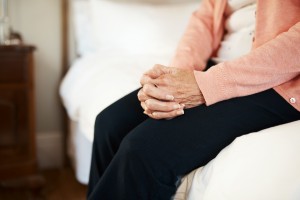Do I Have a Nursing Home Neglect Claim?
Posted on behalf of Jeff Pitman on September 15, 2020
in Nursing Homes and Elder Rights
Updated on April 24, 2024
 Nursing homes have long been under fire for incidents involving abuse or neglect of long-term care residents who must rely on others for their daily care and well-being.
Nursing homes have long been under fire for incidents involving abuse or neglect of long-term care residents who must rely on others for their daily care and well-being.
What are some of the signs that may specifically indicate nursing home neglect? What should you do if this happens? How can you prove neglect?
PKSD discusses some of the warning signs of neglect and what you can do to help gather evidence that may strengthen your chances for a claim.
If you suspect your loved one has been neglected by his or her caregivers, we are prepared to help. We are deeply committed to holding nursing homes responsible for gross negligence. Call our firm anytime, day or night, to schedule your free initial consultation. In this free, no-obligation meeting, we can discuss your loved one’s situation and how we may be able to help.
Signs That May Indicate Neglect
Often, elderly residents may be unable to articulate when they have suffered neglect, even if they are aware of it. So how can you find out if your loved one has suffered from ongoing substandard care?
Here are some common warning signs to look for:
- Consistent poor hygiene
- Dirty living quarters
- Looking unkempt
- Signs of malnutrition and dehydration, such as cracked lips, swollen tongue, dry mouth, unexplained weakness, reduced urine output
- Bedsores
- Frequent urinary tract infections
- Significant personality changes, such as being uncharacteristically fearful, depressed, anxious or angry
- Reacting to medication errors, such as incorrect dosages or missed doses
Gathering Evidence
Gathering evidence for a nursing home neglect claim is difficult under the best of circumstances, especially if you live far from your loved one’s facility. Even in cases where there appears to be clear signs that your family member is being neglected you will still have to prove it.
While it is easier to gather evidence if you can visit your loved one often, here are some active steps any family member can take to help prove nursing home neglect:
- If you see any of the previously mentioned signs, document it and report it to the facility administrators – make sure that you date each entry
- If you speak to caregivers, either record the conversation – with their permission – or write down what was said
- Ask to see your loved one’s medical records to look for inconsistencies, such as if the injuries or medical conditions you have documented align with the facility’s documentation
- If you visit your loved one, photograph, date and document any unexplained bruising, broken bones, signs of physical restraints, UTI’s, and anything else that seems to be relevant to your loved one’s care
- Note your loved one’s physical state of care – are they clean, happy, or are they dressed in dirty clothes
- Contact the local ombudsman to see if the nursing home has a prior history of complaints
- Speak with various caregivers and other family members who may have visited to see if you can get any witness statements
Establishing the Elements of Neglect
As with any case involving negligence, the burden of proof is on the plaintiff. In a nursing home neglect case, it is the same. If you are pursuing a case against a nursing home, you must be able to show that legal negligence exists.
For nursing home neglect cases, you must establish:
Duty of Care
This is typically straightforward in a case of nursing home neglect, because most of these facilities require residents to sign a contract.
Breached Duty of Care
To prove a breached duty of care, you must be able to show that your loved one’s caregiver was not in compliance with the level of accepted care. In a nursing home neglect case, this could mean not giving a patient his or her required medication on time, not providing proper hygiene, failing to take steps to prevent bedsores by periodically turning the patient and more.
Proving Negligence as Causation
The most challenging part of establishing nursing home neglect is providing a direct link between the failed duty of care and the injuries your loved one suffered. Often caregivers may try to shift the blame onto the patient in some way.
Showing Proof of Real Damage
In a negligence claim, there must also be tangible evidence of real damages, such as medical costs. Other related non-economic damages could include pain and suffering, emotional distress, depression or anxiety.
When an Attorney May Benefit Your Claim
Our Wisconsin nursing home abuse lawyers have 150 years of combined legal experience and a highly successful track record. We have obtained millions in compensation for the injured victims we have represented throughout the state, and we are prepared to fight to obtain justice for you and your loved one.
If we represent you, there are no upfront costs or attorney fees to pay while we represent you. There is nothing to pay until the end of your case and only if we obtain compensation on your behalf. We have the resources and staff to thoroughly investigate your case and help you to gather evidence to support your claim. If you cannot come to us, we can come to you to discuss your case. Our initial consultations are completely free, and with no obligation.
Call: 414-333-3333 to learn more about how we may be able to help.






